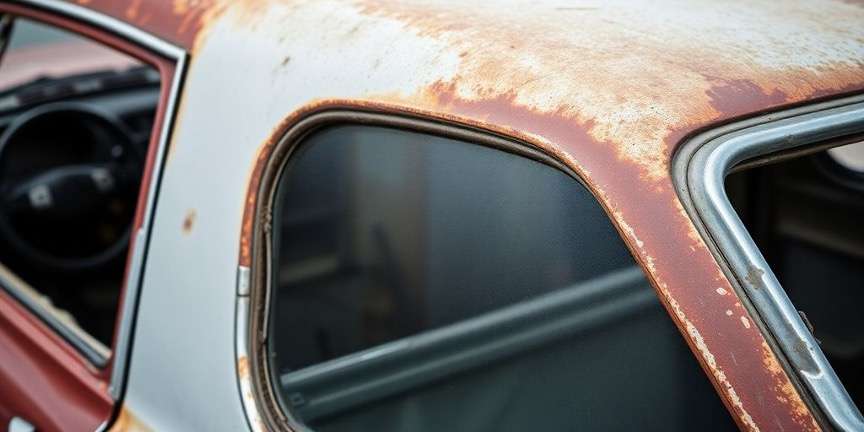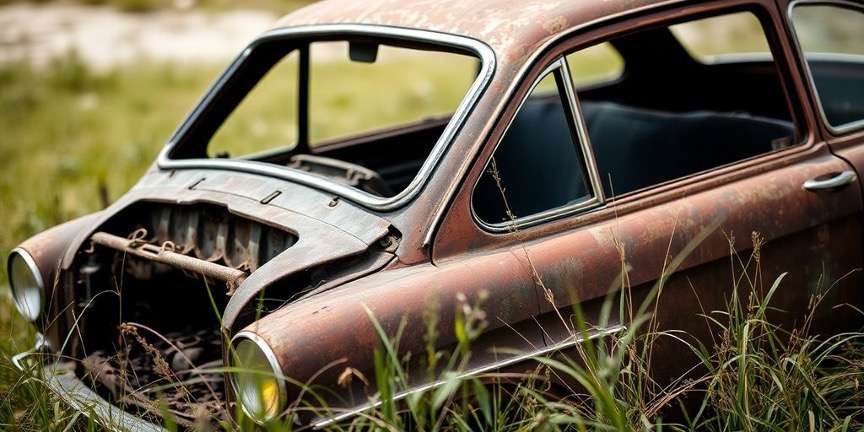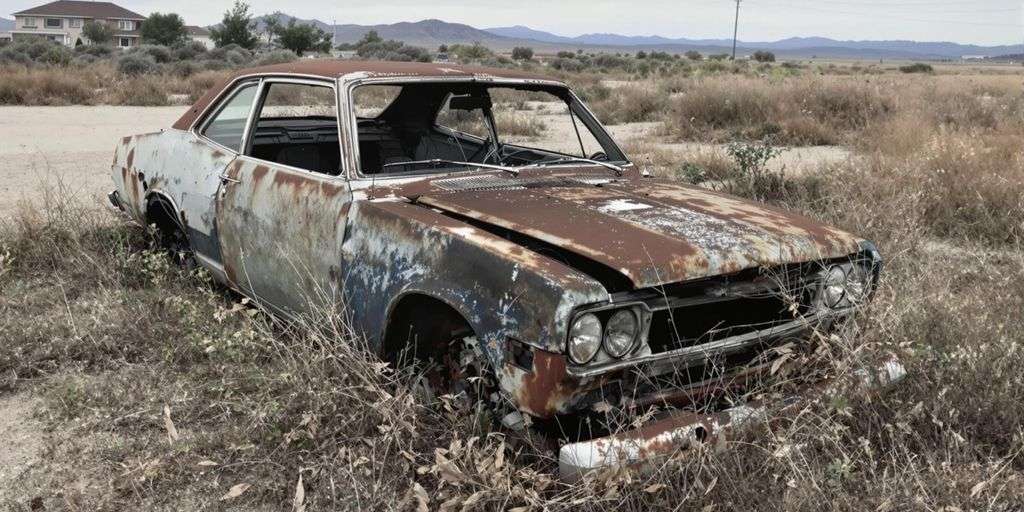Key Takeaways
- You can sell a junk car even if it has missing parts, but expect a lower price.
- Having the car's title is crucial when selling, even if it's just for scrap.
- Research local junkyards and online buyers to find the best offer.
- Prepare your car for sale by documenting its condition and gathering all necessary paperwork.
- Understand the legal requirements for selling a vehicle with missing parts to avoid any issues.
Understanding the Value of a Junk Car
Factors That Affect Junk Car Value
When you’re thinking about selling a junk car, the first thing to understand is what affects its value. Condition is a biggie. A car that’s a rusted heap isn’t going to fetch as much as one that’s in better shape. Then there’s the make and model. Some cars are just more sought after, even in junk form. The age of the car matters too, as older cars might have parts that are no longer made, which can make them more valuable.
How Missing Parts Impact the Price
Missing parts can seriously affect how much you can get for your junk car. If your car is missing major components like the engine or transmission, expect the price to drop. However, if it’s just a few minor things, like a mirror or a door handle, it might not make a huge difference. It’s a good idea to make a list of what’s missing before you start getting quotes.
Why Some Junk Cars Are Still Valuable
You might be surprised to learn that some junk cars are still worth a decent amount. Why? Well, certain cars have parts that are in high demand. Plus, the metal itself can be recycled, which adds to the value. Basically, even if your car looks like it’s been through a war zone, it could still be a goldmine for someone looking to salvage parts or scrap metal.
Sometimes, what seems like a pile of scrap can turn into a hidden treasure when you know what to look for. So, before you give up on that old clunker, consider what might still be valuable.
Legal Considerations When Selling a Junk Car
Importance of Having a Title
When you're thinking about selling your junk car, the title is your golden ticket. It's proof that you legally own the vehicle and have the right to sell it. Without it, you're going to face a lot of roadblocks. If you’ve misplaced your title, don’t panic just yet. You can usually request a duplicate from your local DMV. Just be prepared for some paperwork and maybe a small fee. Having a title not only makes the transaction smoother but also builds trust with potential buyers.
Dealing with Liens on Junk Cars
Selling a car that still has a lien can feel like trying to solve a puzzle without all the pieces. A lien means someone else has a financial claim on your car, usually because you haven’t finished paying off a loan. Before you can sell, you need to clear that lien. This often involves paying off the remaining balance or negotiating with the lienholder. Once the lien is lifted, make sure to get a lien release document. This shows buyers that the car is free from any claims.
Legal Requirements for Selling a Car with Missing Parts
Selling a junk car with missing parts isn't as straightforward as selling a complete vehicle, but it's definitely doable. Transparency is key—you need to be upfront about what's missing. Some states have specific laws about selling cars with missing parts, so it’s a good idea to check local regulations. This might involve additional documentation or disclosures. It’s also wise to keep a record of all communications with the buyer about the car’s condition. This can help protect you if any disputes arise later.
Remember, selling a junk car isn’t just about getting rid of an old vehicle; it’s about doing it the right way. Make sure you’re prepared with all necessary documents and understand your legal obligations. It can save you a lot of hassle down the line.
Preparing Your Junk Car for Sale
Selling a junk car isn't just about finding a buyer; it's about setting yourself up for success. Proper preparation can make the process smoother and potentially even increase the amount you get for your vehicle. Here's how to get your junk car ready for sale.
Documenting the Car's Condition
Before you even think about selling, you need to know exactly what you're dealing with. Take a thorough look at your car and note its condition. This means checking for any missing parts, damage, or anything that might affect its value. Grab a camera and snap pictures from all angles. Clear photos can help potential buyers understand the car's state and may save you from disputes later on. Be honest about any issues; transparency is key.
Gathering Necessary Paperwork
When it comes to paperwork, having everything in order is crucial. Start by ensuring you have the car's title. If it's missing, you might need to contact your local DMV for a replacement. Other documents you should gather include the vehicle history report and any service or maintenance records you have. These documents not only prove ownership but also give potential buyers confidence that they're making a good purchase.
Cleaning and Removing Personal Items
Even if your car is a “junk” car, giving it a good clean can make a difference. Remove all personal belongings—check under seats, in the glove box, and any other storage areas. A car free of clutter presents better and shows you respect the buyer's time and interest. Plus, you might find some forgotten treasures while you're at it!
Preparing your junk car for sale might seem like a hassle, but it's a necessary step to ensure you get the best deal possible. Taking the time to document, gather paperwork, and clean your vehicle can significantly impact the selling process.
Remember, when you're ready to sell, make sure to ask potential buyers about their practices, including whether they provide a recycling certificate to ensure responsible disposal.
Finding the Right Buyer for Your Junk Car
Researching Local Junkyards
Before you rush into selling your junk car, take a moment to explore local junkyards. These places often have different offers and terms, so it's wise to shop around. Begin by compiling a list of nearby junkyards and salvage yards. Call each one to inquire about their buying process and what they might offer for your vehicle. Some might pay more for certain parts, while others might offer free towing services.
Getting Quotes from Multiple Buyers
Once you've gathered a list of potential buyers, it's time to get some quotes. Reach out to each buyer with details about your car's condition, including any missing parts. Be honest and upfront; this will help you get the most accurate offer. Consider asking for a written quote, so you have something to compare. Remember, the highest offer isn't always the best—factor in convenience and any additional services they might provide.
Choosing Between Online and Local Buyers
In today's digital age, you have the option to sell your junk car online or stick with local buyers. Online buyers might offer the convenience of handling everything from your home, but local buyers could provide a quicker sale. Weigh the pros and cons: online sales might take longer but could potentially reach a wider audience, whereas local sales might be faster but limited in scope. Decide what matters more to you—speed or reach.
Selling a junk car isn't just about getting the highest bid; it's about finding the right fit for your needs. Whether it's a local junkyard offering free towing or an online buyer promising a hassle-free process, choose what aligns best with your priorities.
Negotiating the Sale of a Junk Car
How to Negotiate the Best Price
When it comes to selling a junk car, getting the best price requires a bit of strategy. Start by understanding the value of your car. Check similar listings and see what others are getting for cars in similar condition. It's a good idea to gather multiple quotes from different buyers. This gives you leverage when negotiating because you can compare offers and push for a better deal.
Knowing the market value of your car and being prepared with this information can significantly improve your negotiating position.
Don't be afraid to haggle a bit. Buyers expect some negotiation, so it's okay to ask for a bit more than what they initially offer. Just make sure your expectations are reasonable based on the condition and market value of your vehicle.
Understanding Buyer Offers
When you start getting offers for your junk car, it's important to understand what each offer includes. Some buyers might offer a higher price but charge for towing, while others might offer slightly less but include free pickup. Consider all aspects of the offer, not just the final dollar amount.
- Check for hidden fees: Ask if there are any additional costs like towing or processing fees.
- Clarify payment method: Ensure you know how and when you will be paid.
- Get everything in writing: A written agreement can prevent misunderstandings later.
Common Mistakes to Avoid During Negotiation
Negotiating can be tricky, and there are a few common pitfalls to watch out for. One major mistake is misrepresenting the condition of your car. Be honest about what's working and what's not. If a buyer finds out you weren’t truthful, they might back out of the deal.
Another mistake is not removing personal items from the car before showing it to potential buyers. This can make your car look cluttered and less appealing. Also, don't forget to remove your license plates; it's a simple step but often overlooked.
Finally, don't settle for the first offer you get. Car owners should consider several tips when negotiating with junkyards, including obtaining multiple quotes to find the best price for their vehicle. Take your time to evaluate offers and choose the one that makes the most sense for you.
The Selling Process: Step-by-Step

Initial Contact and Inspection
Alright, so you’ve decided to sell your junk car. First things first, you need to make initial contact with potential buyers. This usually means reaching out to local junkyards or used car dealers. When you do, be upfront about the condition of your car. You’ll likely need to provide some details like the make, model, year, and any major issues or missing parts. Once you've made contact, the next step is inspection. Buyers will want to see the car to verify its condition. This might mean sending photos or even having someone come out to take a look. Being honest here is key to avoid any surprises later.
Finalizing the Sale and Payment
After the inspection, it's time to finalize the sale. If everything checks out with what you’ve described, the buyer will make you an offer. This is where you can negotiate a bit, but remember, it’s a junk car. The offer might not be huge, but it’s something. Once you agree on a price, you’ll need to sort out the payment method. Cash is common, but some buyers might offer a check or even a bank transfer. Make sure you're comfortable with the payment method before moving forward.
Transferring Ownership and Paperwork
The last step is all about paperwork. You’ll need to transfer the title of the car to the new owner. This is crucial because it releases you from any future liability. Make sure all the details are correct and that both parties sign the necessary documents. Don’t forget to remove your license plates and cancel your insurance on the vehicle. It’s also a good idea to check with your local DMV to ensure everything is processed correctly.
Selling a junk car might seem daunting, but breaking it down into simple steps makes the process manageable. Remember to be honest and thorough, and you'll be on your way to freeing up space and earning a bit of cash.
Benefits of Selling a Junk Car

Financial Gains from Selling
Selling your junk car can put some extra cash in your pocket. Even if your car seems worthless, there are buyers willing to pay for its parts or scrap metal. This means you can make money from something that’s just taking up space. Plus, you can use the cash from selling your junk car to help finance a new vehicle or pay off bills. Selling your car for cash provides a quick and straightforward way to avoid further depreciation.
Environmental Benefits of Recycling
Recycling your junk car is not just good for your wallet, but it's also great for the environment. Junk cars contain many parts and materials that can be reused or recycled, reducing the need for new resources. This process helps cut down on pollution and saves energy compared to producing new materials. By selling your junk car, you're contributing to a more sustainable future.
Freeing Up Space and Reducing Clutter
Getting rid of a junk car can free up valuable space in your garage or driveway. Imagine all the things you could do with that extra room! Whether you want to store tools, create a workshop, or simply enjoy a clutter-free space, selling your junk car can help you achieve that. Plus, it’s one less thing to worry about maintaining or repairing.
Selling a junk car isn't just about getting rid of an old vehicle; it's about making the most of what you have and turning it into an opportunity for something better.
Wrapping It Up: Selling Your Junk Car
So, there you have it. Selling a junk car, even if it's missing parts, isn't as daunting as it might seem. Just remember to be upfront about what's missing and do a bit of homework to find the best deal. Whether it's for some extra cash or just to clear up space in your driveway, getting rid of that old clunker can be a win-win. So why not give it a shot? You might be surprised at how easy it is to turn that hunk of metal into something useful.
Frequently Asked Questions
Can I sell a junk car if it doesn't run?
Yes, you can sell a junk car even if it doesn't run. Many buyers will tow the car for you.
Is it possible to sell a junk car with missing parts?
Yes, you can sell a junk car with missing parts. Just make sure to tell the buyer which parts are missing.
Do I need the car title to sell my junk car?
Yes, having the car title is important to prove you own the car and can sell it legally.
Why would someone want to buy a junk car?
Buyers often want junk cars for their working parts or the metal, which can be recycled.
Does my junk car need to be paid off before selling it?
Yes, the car should be paid off with no liens, and the title should be in your name to sell it.
What should I do before selling my junk car?
You should document the car's condition, gather all necessary paperwork, and remove personal items.



